- Home
- Diana Wynne Jones
Caribbean Cruising Page 8
Caribbean Cruising Read online
Page 8
Gwendolen revenged herself on Julia at the start of dinner. A footman was just passing a bowl of soup over Julia’s shoulder when the skirt of Julia’s dress turned to snakes. Julia jumped up with a shriek. Soup poured over the snakes and flew far and wide, and the footman yelled, “Lord have mercy on us!” among the sounds of the smashing soup bowl.
Then there was dead silence, except for the hissing of snakes. There were twenty of them, hanging by their tails from Julia’s waistband, writhing and striking. Everyone froze, with their heads stiffly turned Julia’s way. Julia stood like a statue, with her arms up out of reach of the snakes. She swallowed and said the words of a spell.
Nobody blamed her. Mr. Saunders said, “Good girl!”
Under the spell, the snakes stiffened and fanned out, so that they were standing like a ballet skirt above Julia’s petticoats. Everyone could see where Julia had torn a flounce of a petticoat building the tree house and mended it in a hurry with red darning wool.
“Have you been bitten?” said Chrestomanci.
“No,” said Julia. “The soup muddled them. If you don’t mind, I’ll go and change this dress now.”
She left the room, walking very slowly and carefully, and Millie went with her. While the footmen, all rather green in the face, were clearing up the spilled soup, Chrestomanci said, “Spitefulness is one thing I won’t have at the dinner table. Gwendolen, oblige me by going to the playroom. Your food will be brought to you there.”
Gwendolen got up and went without a word. As Julia and Millie did not come back, the dining table seemed rather empty that evening. It was all stocks and shares from Bernard at one end, and statues again from Mr. Saunders at the other.
Cat found that Gwendolen was rather triumphant. She felt she had made an impression on Chrestomanci at last. So she returned to the attack with a will on Sunday.
On Sunday the Family dressed in its best and walked down to Morning Service at the village church. Witches are not supposed to like church. Nor are they supposed to be able to work magic there. But this never bothered Gwendolen at all. Mrs. Sharp had many times remarked on it, as showing what exceptional talents Gwendolen had. Gwendolen sat next to Cat in the Chrestomanci pew, looking the picture of demure innocence in her broiderie anglaise Sunday dress and hat, and found her place in her prayer book as if she were truly saintly.
The village people nudged one another and whispered about her. This rather pleased Gwendolen. She liked to be well known. She kept up the pretense of saintliness until the sermon had begun.
The vicar climbed shakily into the pulpit and gave his text in a weak, wandering voice. “For there were many in the congregation that were not sanctified.” This was certainly to the point. Unfortunately, nothing else he said was. He told, in his weak, wandering voice, of weak, wandering episodes in his early life. He compared them with weak, wandering things he thought were happening in the world today. He told them they had better be sanctified or all sorts of things—which he forgot to mention—would happen, which reminded him of a weak, wandering thing his aunts used to tell him.
Mr. Saunders was asleep by this time, and so was stocks-and-shares Bernard. The old lady with mittens was nodding. One of the saints in the stained-glass windows yawned, and put up his crosier elegantly to cover his mouth. He looked around at his neighbor, who was a formidable nun. Her robes hung in severe folds, like a bundle of sticks. The bishop stretched out his stained-glass crosier and tapped the nun on the shoulder. She resented it. She marched into his window and began shaking him.
Cat saw her. He saw the colored, transparent bishop clouting the nun over the wimple, and the nun giving him as good as she got. Meanwhile, the hairy saint next to them made a dive for his neighbor, who was a kingly sort of saint, holding a model of the Castle. The kingly saint dropped his model and fled for protection, in a twinkle of glassy feet, behind the robes of a simpering lady saint. The hairy saint jumped gleefully up and down on the model of the Castle.
One by one, all the windows came to life. Almost every saint turned and fought the one next to him. Those who had no one to fight either hitched up their robes and did silly dances, or waved to the vicar, who rambled on without noticing. The little tiny people blowing trumpets in the corners of the windows sprang and gamboled and frisked, and pulled transparent faces at anyone who was looking. The hairy saint winkled the kingly one out from behind the simpering lady and chased him from window to window in and out of all the other fighting couples.
By this time, the whole congregation had seen. Everyone stared, or whispered, or leaned craning this way and that to watch the twinkling glass toes of the kingly saint.
There was such a disturbance that Mr. Saunders woke up, puzzled. He looked at the windows, understood, and looked sharply at Gwendolen. She sat with her eyes demurely cast down, the picture of innocence. Cat glanced at Chrestomanci. For all he could tell, Chrestomanci was attending to the vicar’s every word and had not even noticed the windows. Millie was sitting on the edge of her seat, looking agitated. And the vicar still rambled on, quite unconscious of the turmoil.
The curate, however, felt he ought to put a stop to the unseemly behavior of the windows. He fetched a cross and a candle. Followed by a giggling choirboy swinging incense, he went from window to window murmuring exorcisms. Gwendolen obligingly stopped each saint in its tracks as he came to it—which meant that the kingly saint was stranded halfway across the wall. But, as soon as the curate’s back was turned, he began to run again, and the free-for-all went on more riotously than before. The congregation rolled about, gasping.
Chrestomanci turned and looked at Mr. Saunders. Mr. Saunders nodded. There was a sort of flicker, which jolted Cat where he sat and, when he looked at the windows, every saint was stand-ing stiff and glassy there, as they should be. Gwendolen’s head came up indignantly. Then she shrugged. At the back of the church a great stone crusader sat up on his tomb and, with much rasping of stone, thumbed his nose at the vicar.
“Dearly beloved—” said the vicar. He saw the crusader. He stopped, confounded.
The curate hastened up and tried to exorcise the crusader. A look of irritation crossed the crusader’s face. He lifted his great stone sword. But Mr. Saunders made a sharp gesture. The crusader, looking even more irritated, lowered his sword and lay down again with a thump that shook the church.
“There are some in this congregation who are certainly not sanctified,” the vicar said sadly. “Let us pray.”
When everyone straggled out of church, Gwendolen sauntered out among them, quite impervious to the shocked looks everyone gave her as she passed. Millie hurried after her and seized her arm. She looked most upset. “That was disgraceful, you ungodly child! I don’t dare speak to the poor vicar. There is such a thing as going too far, you know!”
“Have I gone it?” Gwendolen asked, really interested.
“Very nearly,” said Millie.
But not quite, it seemed. Chrestomanci did not say anything to Gwendolen, though he said a great deal, very soothingly, both to the vicar and to the curate.
“Why doesn’t your father tell Gwendolen off?” Cat asked Roger as they walked back up the avenue. “Taking no notice of her just makes her worse.”
“I don’t know,” said Roger. “He comes down on us hard enough if we use witchcraft. Perhaps he thinks she’ll get tired of it. Has she told you what she’s going to do tomorrow?” It was clear Roger could hardly wait.
“No. She’s cross with me for playing soldiers with you,” said Cat.
“Her stupid fault for thinking she owns you,” said Roger. “Let’s get into old clothes and build some more of the tree house.”
Gwendolen was angry when Cat went off with Roger again. Maybe that was why she thought of what she did next. Or perhaps, as she said, she had other reasons. At all events, when Cat woke up on Monday morning, it was dark. It felt very early. It looked even earlier. So Cat turned over and went to sl
eep again.
He was astonished to find Mary shaking him a minute later. “It’s twenty to nine, Eric. Get up, do!”
“But it’s dark!” Cat protested. “Is it raining?”
“No,” said Mary. “Your sister’s been hard at it again. And where she gets the strength from, a little girl like her, beats me!”
Feeling tired and Mondayish, Cat dragged himself out of bed and found he could not see out of the windows. Each window was a dark crisscross of branches and leaves—green leaves, bluish cedar sprays, pine needles, and leaves just turning yellow and brown. One window had a rose pressed against it, and there were bunches of grapes squashed on both of the others. And behind them, it looked as if there was a mile-thick forest. “Good Lord!” he said.
“You may well look!” said Mary. “That sister of yours has fetched every tree in the grounds and stood them as close as they can get to the Castle. You wonder what she’ll think of next.”
The darkness made Cat weary and gloomy. He did not want to get dressed. But Mary stood over him, and made him wash too. The reason she was so dutiful, Cat suspected, was that she wanted to tell someone all about the difficulties the trees were causing. She told Cat that the yew trees from the formal garden were packed so tight by the kitchen door that the men had to hack a path for the milk to come through. There were three oak trees against the main front door, and no one could budge it. “And the apples are all underfoot among the yew trees, so it smells like a cider press in the kitchen,” Mary said.
When Cat arrived wearily in the playroom, it was even darker there. In the deep greenish light, he could see that Gwendolen was, understandably, white and tired. But she looked satisfied enough.
“I don’t think I like these trees,” Cat whispered to her when Roger and Julia had gone through to the schoolroom. “Why couldn’t you do something smaller and funnier?”
“Because I’m not a laughingstock!” Gwendolen hissed back. “And I needed to do it. I had to know how much power I could draw on.”
“Quite a lot, I should think,” Cat said, looking at the mass of horse-chestnut leaves pressed against the window.
Gwendolen smiled. “Better still when I’ve got my dragons’ blood.”
Cat nearly blurted out that he had seen dragons’ blood in Mr. Saunders’ workshop. But he stopped himself in time. He did not care for mighty works like this.
They spent another morning with the lights on, and at lunchtime, Cat, Julia, and Roger went out to have a look at the trees. They were disappointed to find that it was quite easy to get out of their private door. The rhododendrons were three feet away from it. Cat thought Gwendolen must intentionally have left them a way out, until he looked up and saw, from their bent branches and mashed leaves, that the bushes had indeed been squashed against the door earlier. It looked as if the trees were retreating.
Beyond the rhododendrons, they had to fight their way through something like a jungle. The trees were rammed so tight that, not only had twigs and leaves broken off by cartloads, but great branches had been torn away too, and fallen tangled with smashed roses, broken clematis, and mangled grapes. When the children tore themselves out on the other side of the jungle, blank daylight hit them like a hammer blow. They blinked. The gardens, the village, and even the hills beyond were bald. The only place where they could still see trees was above the old, gray, ruined wall of Chrestomanci’s garden.
“It must have been a strong spell,” said Roger.
“It’s like a desert,” said Julia. “I never thought I’d miss the trees so much!”
But halfway through the afternoon it became clear that the trees were going back to their proper places. They could see sky through the schoolroom window. A little later the trees had spread out and retreated so much that Mr. Saunders turned the light off. Shortly after that Cat and Roger noticed the ruins of the tree house, smashed to bits in the crowding, dangling-out of a chestnut tree.
“Now what are you staring at?” said Mr. Saunders.
“The tree house is broken,” Roger said, looking moodily at Gwendolen.
“Perhaps Gwendolen would be kind enough to mend it again,” Mr. Saunders suggested sarcastically.
If he was trying to goad Gwendolen into doing a kindly act, he failed. Gwendolen tossed her head. “Tree houses are stupid babyish things,” she said coldly. She was very annoyed at the way the trees were retreating. “It’s too bad!” she told Cat just before dinner. By that time the trees were almost back to their usual places. The only ones nearer than they should be were those on the hill opposite. The view looked smaller, somehow. “I hoped it would do for tomorrow too,” Gwendolen said discontentedly. “Now I shall have to think of something else.”
“Who sent them back? The garden warlocks?” Cat asked.
“I wish you wouldn’t talk nonsense,” said Gwendolen. “It’s obvious who did it.”
“You mean Mr. Saunders?” said Cat. “But couldn’t the spell have been used up just pulling all the trees here?”
“You don’t know a thing about it,” said Gwendolen.
Cat knew he knew nothing of magic, but he found it queer all the same. The next day, when he went to see, there were no fallen twigs, torn-off branches, or squashed grapes anywhere. The yew trees in the formal garden did not seem to have been hacked at all. And though there was not a trace of an apple underfoot around the kitchen, there were boxes of firm, round apples in the courtyard. In the orchard, the apples were all either hanging on the trees or being picked and put in more boxes.
While Cat was finding this out, he had to flatten himself hastily against one of the hedge-like apple trees to make way for a galloping Jersey cow pursued by two gardeners and a farm boy. There were cows galloping in the wood when Cat went hopefully to look at the tree house. Alas, that was still a ruin. And the cows were doing their best to ruin the flowerbeds and not making much impression.
“Did you do the cows?” he asked Gwendolen.
“Yes. But it was just something to show them I’m not giving up,” said Gwendolen. “I shall get my dragons’ blood tomorrow and then I can do something really impressive.”
8
G WENDOLEN WENT down to the village to get her dragons’ blood on Wednesday afternoon. She was in high glee. There were to be guests that night at the Castle and a big dinner party. Cat knew that everyone had carefully not mentioned it before, for fear Gwendolen would take advantage of it. But she had to be told on Wednesday morning because there were special arrangements for the children. They were to have their supper in the playroom, and they were supposed to keep out of the way after that.
“I’ll keep out of the way, all right,” Gwendolen promised. “But that won’t make any difference.” She chuckled about it all the way to the village.
Cat was embarrassed when they got to the village. Everyone avoided Gwendolen. Mothers dragged their children indoors and snatched babies out of her way. Gwendolen hardly noticed. She was too intent on getting to Mr. Baslam and getting her dragons’ blood. Cat did not fancy Mr. Baslam, or the decaying pickle smell among his stuffed animals. He let Gwendolen go there on her own, and went to mail his postcard to Mrs. Sharp in the sweet shop. The people there were rather cool with him, even though he spent nearly two shillings on sweets, and they were positively cold in the cake shop next door. When Cat came out onto the green with his parcels, he found that children were being snatched out of his way too.
This so shamed Cat that he fled back to the Castle grounds and did not wait for Gwendolen. There he wandered moodily, eating toffees and penny buns, and wishing he was back with Mrs. Sharp. From time to time he saw Gwendolen in the distance. Sometimes she was dashing about. Sometimes she was squatting under a tree, care-fully doing something. Cat did not go near her. If they were back with Mrs. Sharp, he thought, Gwendolen would not need to do whatever impressive thing she was planning. He found himself wishing she was not quite such a strong and determined witc
h. He tried to imagine a Gwendolen who was not a witch, but he found himself quite unable to. She just would not be Gwendolen.
Indoors, the usual silence of the Castle was not quite the same. There were tense little noises, and the thrumming feeling of people diligently busy just out of earshot. Cat knew it was going to be a big, important dinner party.
After supper, he craned out of Gwendolen’s window watching the guests come up the piece of avenue he could see from there. They came in carriages and in cars, all very large and rich-looking. One carriage was drawn by six white horses and looked so impressive that Cat wondered if it might not even be the King.
“All the better,” said Gwendolen. She was squatting in the middle of the carpet, beside a sheet of paper. At one end of the paper was a bowl of ingredients. At the other crawled, wriggled, or lay a horrid heap of things. Gwendolen had collected two frogs, an earthworm, several earwigs, a black beetle, a spider, and a little pile of bones. The live things were charmed and could not move off the paper.
As soon as Cat was sure that there were no more carriages arriving, Gwendolen began pounding the ingredients together in the bowl. As she pounded, she muttered things in a groaning hum, and her hair hung down and quivered over the bowl. Cat looked at the wriggling, hopping creatures and hoped that they were not going to be pounded up as ingredients too. It seemed not. Gwendolen at length sat back on her heels and said, “Now!”
She snapped her fingers over the bowl. The ingredients caught fire, all by themselves, and burned with small blue flames. “It’s working!” Gwendolen said excitedly. She snatched up a twist of newspaper from beside her and carefully untwisted it. “Now for a pinch of dragons’ blood.” She took a pinch of the dark brown powder and sprinkled it on the flames. There was a fizzing, and a thick smell of burning. Then the flames leaped up, a foot high, blazing a furious green and purple, coloring the whole room with dancing light.
Gwendolen’s face glowed in the green and purple. She rocked on her heels, chanting, chanting strings of things Cat could not understand. Then, still chanting, she leaned over and touched the spider. The spider grew. And grew. And grew more. It grew into a five-foot monster—a greasy roundness with two little eyes on the front, hanging like a hammock amid eight bent and jointed furry legs. Gwendolen pointed. The door of her room sprang open of its own accord—which made her smile exultantly—and the huge spider went silently creeping towards it, swaying on its hairy legs. It squeezed its legs inward to get through the door, and crept onward, down the passage beyond.

 Fire and Hemlock
Fire and Hemlock Reflections: On the Magic of Writing
Reflections: On the Magic of Writing The Game
The Game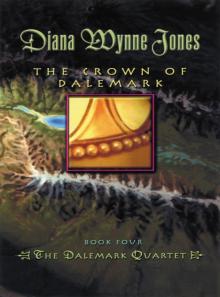 The Crown of Dalemark
The Crown of Dalemark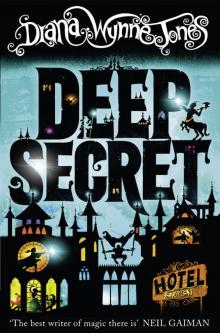 Deep Secret
Deep Secret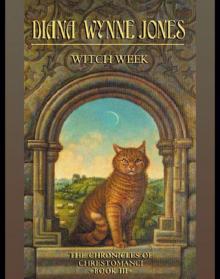 Witch Week
Witch Week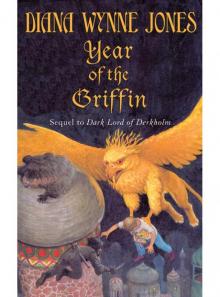 Year of the Griffin
Year of the Griffin Wild Robert
Wild Robert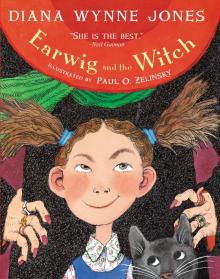 Earwig and the Witch
Earwig and the Witch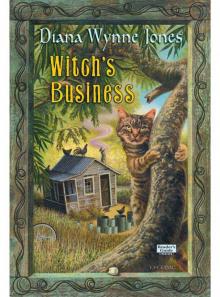 Witch's Business
Witch's Business Dogsbody
Dogsbody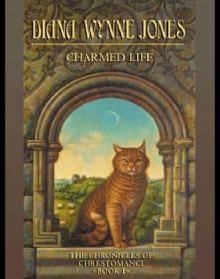 Caribbean Cruising
Caribbean Cruising Cart and Cwidder
Cart and Cwidder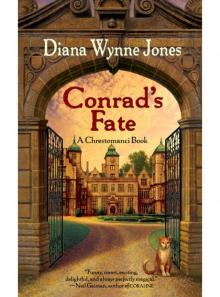 Conrad's Fate
Conrad's Fate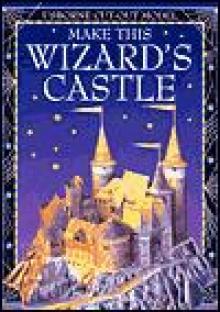 Howl's Moving Castle
Howl's Moving Castle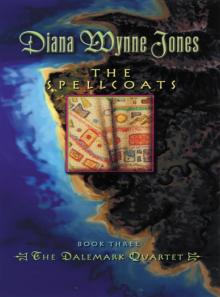 The Spellcoats
The Spellcoats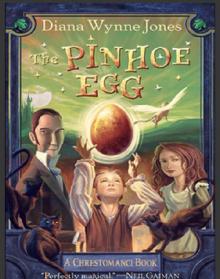 The Pinhoe Egg
The Pinhoe Egg Drowned Ammet
Drowned Ammet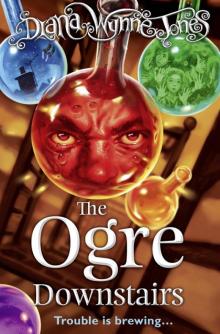 The Ogre Downstairs
The Ogre Downstairs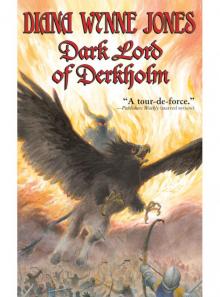 Dark Lord of Derkholm
Dark Lord of Derkholm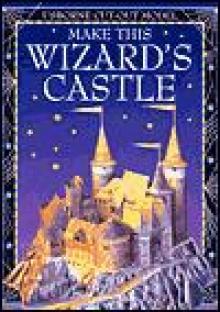 Castle in the Air
Castle in the Air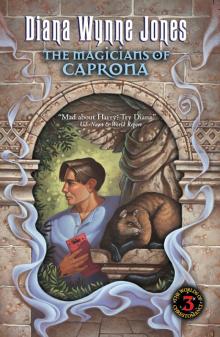 The Magicians of Caprona
The Magicians of Caprona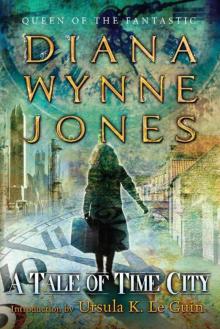 A Tale of Time City
A Tale of Time City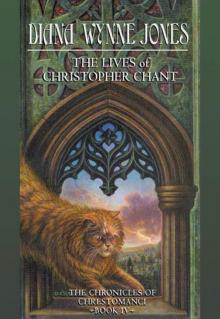 The Lives of Christopher Chant
The Lives of Christopher Chant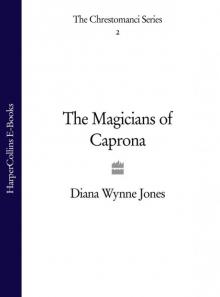 The Magicians of Caprona (UK)
The Magicians of Caprona (UK)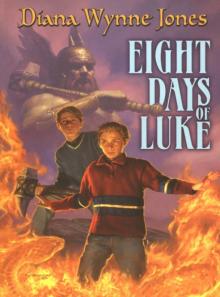 Eight Days of Luke
Eight Days of Luke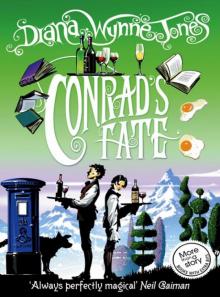 Conrad's Fate (UK)
Conrad's Fate (UK)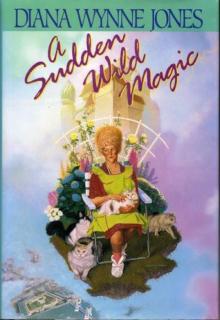 A Sudden Wild Magic
A Sudden Wild Magic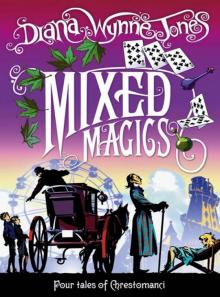 Mixed Magics (UK)
Mixed Magics (UK)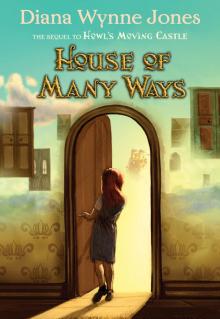 House of Many Ways
House of Many Ways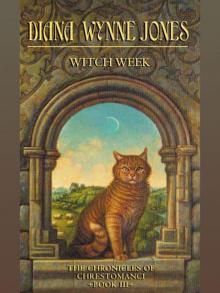 Witch Week (UK)
Witch Week (UK)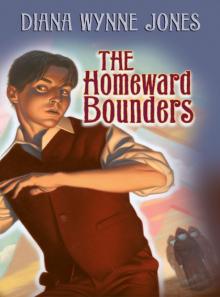 The Homeward Bounders
The Homeward Bounders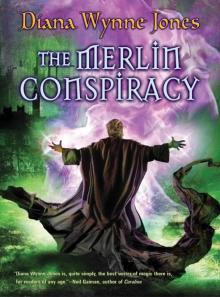 The Merlin Conspiracy
The Merlin Conspiracy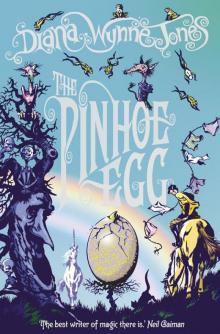 The Pinhoe Egg (UK)
The Pinhoe Egg (UK)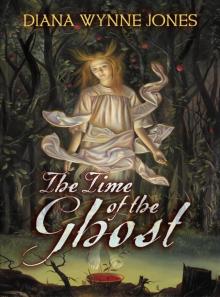 The Time of the Ghost
The Time of the Ghost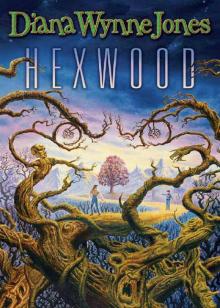 Hexwood
Hexwood Enchanted Glass
Enchanted Glass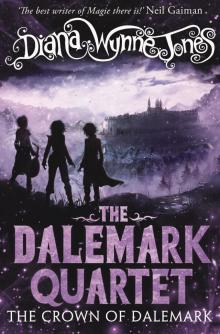 The Crown of Dalemark (UK)
The Crown of Dalemark (UK)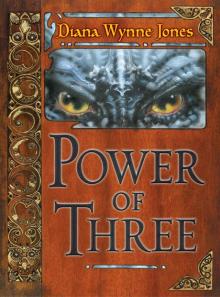 Power of Three
Power of Three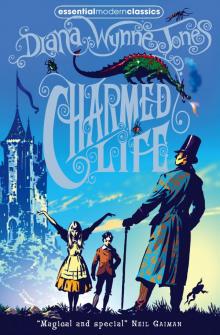 Charmed Life (UK)
Charmed Life (UK)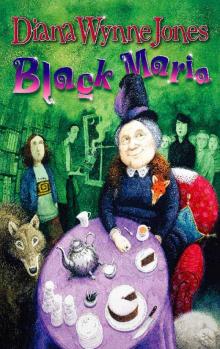 Black Maria
Black Maria The Islands of Chaldea
The Islands of Chaldea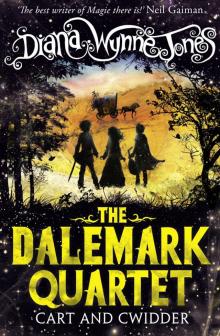 Cart and Cwidder (UK)
Cart and Cwidder (UK)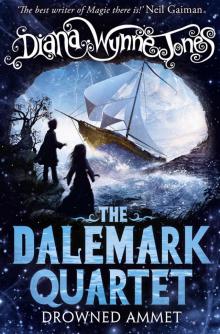 Drowned Ammet (UK)
Drowned Ammet (UK)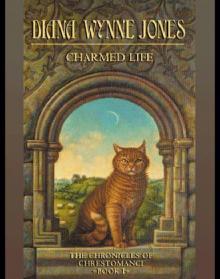 Charmed Life
Charmed Life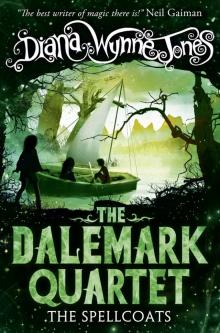 The Spellcoats (UK)
The Spellcoats (UK)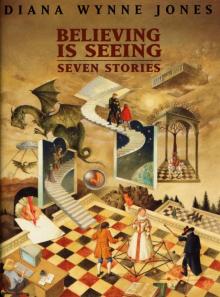 Believing Is Seeing
Believing Is Seeing Samantha's Diary
Samantha's Diary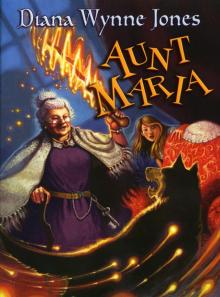 Aunt Maria
Aunt Maria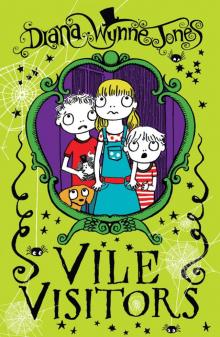 Vile Visitors
Vile Visitors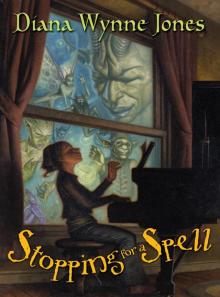 Stopping for a Spell
Stopping for a Spell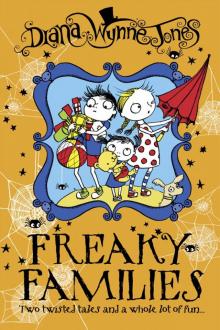 Freaky Families
Freaky Families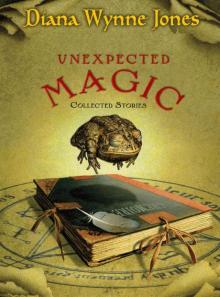 Unexpected Magic
Unexpected Magic Reflections
Reflections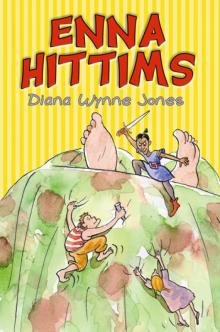 Enna Hittms
Enna Hittms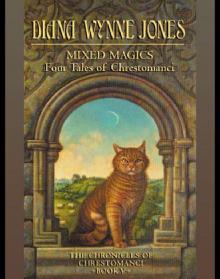 Mixed Magics: Four Tales of Chrestomanci
Mixed Magics: Four Tales of Chrestomanci